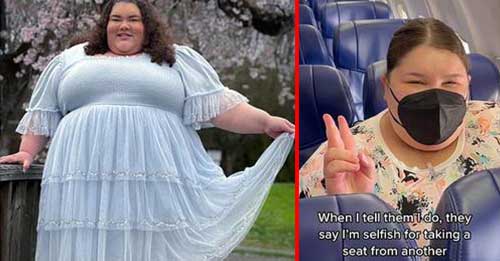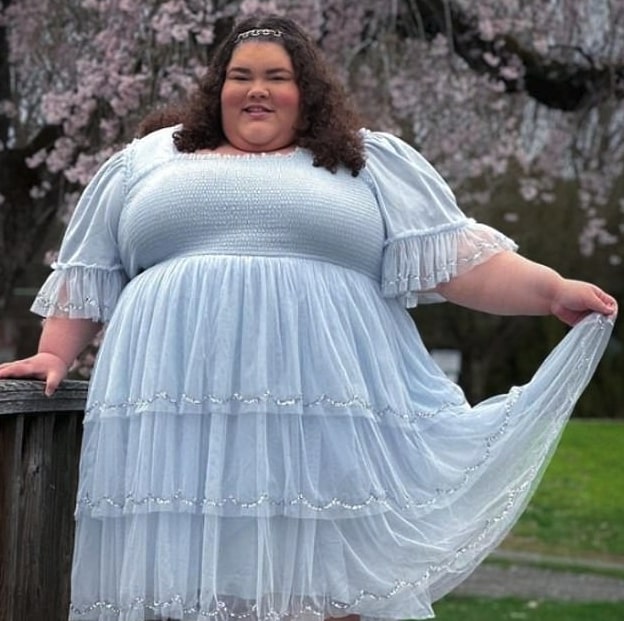A plus-sized influencer has urged that the Federal Aviation Administration and airlines provide overweight passengers with as many free seats as they need to travel comfortably.
Jaelynn Chaney, a Vancouver-based travel and lifestyle designer, wants the Federal Aviation Administration to ‘protect’ plus-sized travelers and make traveling by coach pleasant and accessible for all.
She desires that airlines be required to reimburse overweight travelers for any additional seats they must buy when booking to accommodate their girth.
As plus-size travelers, her boyfriend and herself have sadly faced prejudice and discomfort when traveling, she said in her petition, which had about 4,300 signatures as of Saturday afternoon.
She went on to say that all plus-size passengers should be supplied with an additional free seat, or perhaps two or three seats based on their size, to fulfill their demands and assure their comfort throughout the journey.
Airlines should give a refund to plus-size customers who buy extra seats separately, Chaney said of refunds. This should be a simple procedure that is accessible online or via customer care.
Chaney agrees that if she gets her way, ticket costs would have to increase, and she acknowledges that non-overweight customers may face higher ticket fees to help pay for renovations.
Her fiancé was treated to harsh words, disapproving stares, and even a refusal to sit next to them on a trip from Pasco to Denver, amounting to discrimination.
On another trip, she was compelled to take just one seat with immovable armrests, which caused her agony and left her with scars.
Chaney has extensively chronicled her travel difficulties in videos uploaded to her Instagram, from showing her and her partner being crammed into seats to displaying what other people have said to her, including asking her whether she purchased two tickets.
However, when Chaney is forced to occupy just one seat, she may experience discomfort and chafing, as well as bad treatment from other passengers.
This maltreatment of plus-size passengers is intolerable, and it underscores the critical need for stronger regulations that safeguard the dignity and rights of all passengers, irrespective of size, she wrote.
Unfortunately, plus-size travelers are often subjected to discomfort and prejudice when traveling. The absence of a consistent customer-size airline policy is unacceptable and must be rectified.
Chaney is now using seatbelt extenders to make flying more pleasant. She hasn’t said why she doesn’t travel business or first class, which have substantially larger seats but are much more costly than standard coach seats.
She also feels that crew members should be educated on how to handle plus-size travelers, including addressing delicate situations and providing acceptable customer service.
She also feels that the TSA should be taught and should establish clear rules for screening plus-size travelers, teach agents how to politely engage with plus-size travelers, provide sensitivity training, and provide accessible screening equipment.
Chaney has also proposed that all new airplanes have a wheelchair-accessible bathroom.
This modification will increase accessibility for passengers of all sizes and abilities, enabling them to use the restroom comfortably and easily. This would create a more inclusive and accommodating travel experience while proving the industry’s commitment to serve all customers equitably, she stated in her petition.
But Chaney said that she wasn’t certain who would be responsible for funding the cost of the modifications she proposed, but she felt the changes were worthwhile.
It is impossible to offer a one-size-fits-all solution to who would pay for the policies stated in the petition, she said in a statement.
While implementing regulations to accommodate plus-size travelers may incur expenses, these expenditures must be balanced against the advantages of establishing a more welcoming and inclusive travel experience.
She advocated for airlines to cease overselling tickets so that those that remain might be utilized to accommodate bigger people.
She said that the government may have a role to play in subsidizing or rewarding these measures, as part of its obligation to encourage accessible and equitable transportation for all residents.
Ultimately, the issue of who will pay for these initiatives should not be an impediment to action, she said.
According to the FAA, by enforcing these regulations, airlines will provide a more inclusive and inviting atmosphere for all customers, regardless of size. It’s time for the airline industry to take a position and commit to making all customers feel more welcome and comfortable. Join us in requesting that the FAA act to safeguard plus-size travelers, she stated in her petition.






